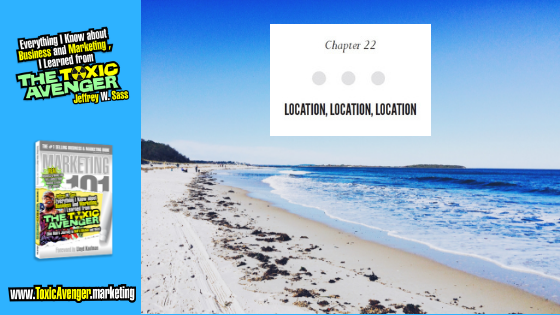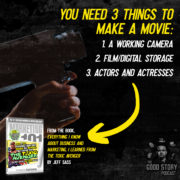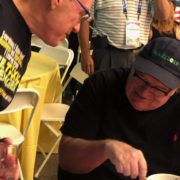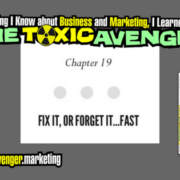Chapter 22: Location, Location, Location
Greetings from Tromaville! Here is Chapter 22 of my book, Everything I Know about Business and Marketing, I Learned from THE TOXIC AVENGER. This chapter explores some of the negotiation skills learned from scouting film locations and the importance of finding and leveraging your team’s hidden passions and talents.
If you haven’t done so already, you can read the Foreword by Troma co-founder, Lloyd Kaufman, and the Introduction to the book as well as Chapter 1, 2, 3, 4, 5 and 6, 7 ,8, 9, 10, 11, 12, 13, 14, 15, 16, 17, 18, 19, 20 and 21. You can also see me read a few chapters live, along with Lloyd and Toxie, at Florida Supercon as well as a few chapters I read on Facebook Live. Stay tuned for additional chapters to be published here. If you like what you read and can’t wait for more, please don’t be shy. You can buy the book now on Amazon (and also please don’t be shy about sharing, and reviewing the book when you do read it.) Both Toxie and I greatly appreciate your support! – Jeff Sass
Chapter 22: Location, Location, Location
War is hell. And the hell of Troma’s War, according to the script, begins with a horrific, fiery plane crash onto a deserted tropical island. So, all we needed to recreate such a scene was a beautiful, desolate beach, with no hint of civilization. Oh, and of course we would need to “dress” such a pristine and lovely beach with the smoldering remains of a commercial passenger aircraft, post-crash. Easy, right? As it turned out, thanks to the terrific support of the NY State Governor’s Film Commission (again, many years before Lloyd’s wife Pat would be appointed to head said commission), we were told about a little-known property of the state, on the north shore of Long Island, Caumsett State Park.
Once owned by Marshall Field III and purchased by the State of New York in 1961, the beach at the park was situated on a peninsula, Lloyd Neck (coincidence? I think not) that jutted out into the Long Island sound in such a way that you could create a view where no buildings or lights were visible. Just unobstructed water and hilly beach, with trees along the edges of the sand. It was perfect, but it was complicated. There was nothing in the area where we needed to film. No buildings, no structures, no electricity or bathrooms or phones. At least three miles from anything even resembling civilization. Visually perfect and a logistic nightmare. Not only would we have to get cast, crew, equipment, and props there (and back) but we had night filming on the schedule and a wide range of required environmental rules and guidelines we’d have to adhere to in order to keep the location in the same condition as we found it. Still, the location was perfect (and, as a state-owned property, the price was right…zippo, as long as we arranged for the proper permits).
Troma’s War was essentially shot on two primary locations: Caumsett State Park on Long Island and Camp Smith in Peekskill, NY. Both locations were handed to us courtesy of the NY State Governor’s Film Commission, an invaluable resource for an independent production such as ours. Our set department managed to get hold of airplane doors and pieces of fuselage and other airplane parts such that we truly made the once-pristine beach look like an actual crash site. The natural beauty of the location created production values that far exceeded our budget and made Troma’s War one of the best-looking Troma films to date when it was released. The woods on the edges of the beach blended well with the woods of Camp Smith creating a realistic and believable deserted island setting as, in the finished film, we seamlessly move back and forth between the two distinct (and distinctly different) locales. Essentially, everything on the beach was shot at Caumsett State Park, and everything in the woods was shot at Camp Smith. When actors are seen stepping into the woods from the beach, they were essentially then teleporting themselves to the woods of Camp Smith. Ahh, the magic of the cinema…
As one can glean from the title, Troma’s War involved lots of battles (and I am not just referring to the arguments between Lloyd, Michael, and myself…one of which drove me to quit. But I returned, and I digress). The script called for lots of action, guns, and explosions. Pyrotechnics was practically a supporting actor based on the number of scenes that called for explosions and blasts. Fortunately, we had the services of the soft-spoken Will Caban, aptly nicknamed “Will Kaboom,” to handle the more explosive pages of the script. Will was quiet, calm, and completely dedicated to his craft of blowing things to kingdom come. He drove around in a nondescript, beat-up brown panel van loaded with mortars and mounds of flammable and explosive materials. I could not imagine today how he could do what he did then, but I always admired him as a man who truly had a blast at work.
The weapons of War were another challenge as the script called for a very well-armed militia of terrorist baddies and near-constant gunfights. Renting realistic stage guns, including heavy arms and automatic weapons, along with the requisite rounds of noisy, flash-firing “blanks,” can be a costly and complicated proposition. As much as the actual rental of such equipment was a big deal, as weapons were needed just about every day, we’d need a near full-time weapons wrangler to manage, secure, and clean all the weapons, as well as train our actors and actresses in the proper and safe use of the arsenal. As it turned out, the owner of NY’s best modern theatrical gun collection was also an accomplished actor in his own right, and so not only did we rent his guns, buy his ammunition, and hire him as their daily wrangler but we also cast Rick Washburn in one of the lead roles. If he had to be on the set every day to handle the weapons anyway, we might as well use him in front of the camera too. And we did.
Lesson learned: Find out the hidden talents of your teammates, and explore how they can use their passions to further your cause. Just as we were able to leverage Rick Washburn, the actor, to maximize his contribution as more than just the weapons guy, what are the talents of your team that can be utilized? Do you have budding photographers and videographers among your midst? Wouldn’t they love to show off their talents to benefit the company rather than have you hire some outsider to do something they are already passionate about? Your best contractors and evangelists could already be in your midst. Give them a chance to shine in an area they weren’t necessarily hired for. What do you think?
With the near-daily requirement of shooting off weapons and blowing stuff up, we needed a location that would allow such things. Not every neighborhood would welcome such noisy violence as easily as Croton-on- Hudson took to our explosive home demolition. And besides, the blast we had at Croton-on-Hudson was a year or so after Troma’s War was over. But Camp Smith was perfect! As a military training facility, the sound of artillery fire and explosions were de rigueur. They even had their own on-site fire department to handle the aftermath of Mr. Caban’s kabooms. The Colonel and his staff could not have been more accommodating, and the woods and grounds of Camp Smith became our home away from home for the majority of the filming of Troma’s War.
In truth, the two locations, Caumsett State Park and Camp Smith, played a substantial role in the success of the film (and by Troma standards, the war was won, and Troma’s War was a success). It was also the early and growing days of home video, and Troma’s War was first in a series of well-publicized Troma VHS releases by Media Home Entertainment, one of the leaders in the then-nascent home-video industry.
Scouting for and securing filming locations was by far one of my favorite aspects of making movies, and the skills and experiences handling such negotiations are some of the most valuable I’ve carried forward throughout my career. Relationships, sincerity, authenticity, and directness were the keys to successfully securing locations like Camp Smith and Caumsett State Park. We were upfront about our needs and the content we were creating, and we were upfront about our respect for the process and responsibility to care for the people and property under our watch (remember the “Rules of Production”).
• • •
That’s Chapter 22 – What do you think? Have you given your team the chance to use their hidden talents in addition to their core responsibilities? Has it had an impact? Stay tuned for Chapter 23: “Everyone is Expendable (Especially if you Wear a Mask)” which shares a lesson about dealing with talent (i.e. employees) and their unique quirks, and recognizing that everyone is expendable… even y0u and me.
The book in previous posts:
Foreword, by Lloyd Kaufman
Introduction: Lights, Camera, Action!
Chapter 1: Welcome to Tromaville!
Chapter 2: The Troma Building
Chapter 3: Meet the Moguls
Chapter 4: Trailer Trash
Chapters 5 and 6: Working FREE-lance & Becoming a Full-time Tromite
Chapter 7: Branding Begins on the Ground Floor
Chapter 8: The Power of We
Chapter 9: Old Yeller (and Be Your Brand)
Chapter 10: Find Something to Believe In
Chapter 11: Show Up!
Chapter 12: Sink or Swim!
Chapter 13: Embrace your Vision and Culture!
Chapter 14: Strategic Partners – Burn Houses, Not Bridges
Chapter 15: If You Don’t Want to Swallow a Frog, Start with a Stunt
Chapter 16: Repurpose, On Purpose!
Chapter 17: Always Salute the Schwag!
Chapter 18: Playing by the Rules
Chapter 19: Fix it, or Forget it… Fast!
Chapter 20: This Means WAR!
Chapter 21: Delegate or Die!













Trackbacks & Pingbacks
[…] 1, 2, 3, 4, 5 and 6, 7, 8, 9, 10, 11, 12, 13, 14, 15, 16, 17, 18, 19, 20, 21, 22, 23, 24, 25, 26, 27 and 28. You can also see me read a few chapters live, along with Lloyd and […]
Comments are closed.